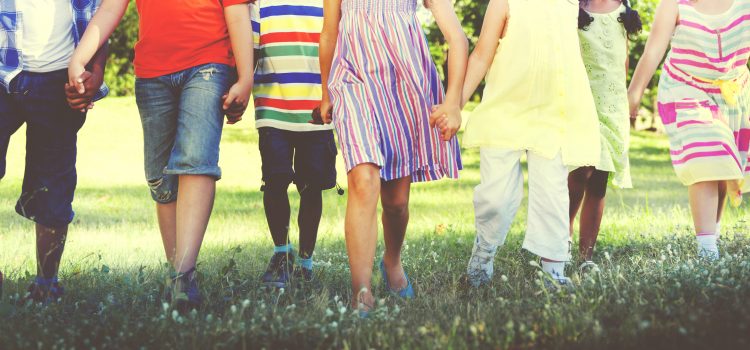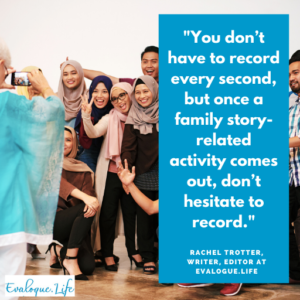
It’s that time of year when there is plenty of planning for family reunions. What thoughts stir in your brain when you hear those two simple words – family reunion? For me there are many, and they are mixed with happiness and a touch of anxiety. But I know the anxiety part doesn’t need to be there, and I am determined to fix it. In order to do so, I need to add some organization to each reunion and provide chances for family stories to unfold. I know, I know, no one wants to be that family member who people want run and hide from when they arrive because they’re the “family history person.” But folks, we should all be “that family history person” and incorporate some stories into the day. How? Let’s talk about it.
Family Reunions – A Timeless Tradition
As a kid, I quite enjoyed family reunions. It meant cousin time which was always my favorite and it usually meant adventures. My large extended family had a yearly reunion in Malad, Idaho, in a large pasture surrounded by a woodsy area where we could always go and explore. There was a great mountain with hiking trails nearby and the food was always divine.
Related: Family vacations create great family stories
As a young adult, my maternal grandparents’ family grew big enough that we started having “destination” reunions in the western United States. A fabulous time, but a little stressful with my tiny and growing family. Now that same family has exploded in size and we settle for a one-day family reunion in the closest local city. The day falls closest to my grandparents’ anniversary, even though they passed away 15 years ago. After each reunion, I’m always glad I went, but I kind of dread getting there beforehand. Anyone feel the same way?
My husband’s family is a terrific model for family reunions and I have learned a lot from their example. I want to offer a few ideas they have tried and others I have stumbled on over the years. And a note to my family: I will be hoping to incorporate some of these ideas in the coming years!
Related: The power of remembering ancestors
1. Share some stories (and record them)
In most families, there is usually one group put in charge of the reunion each year and it rotates. This is true in my family’s and my husband’s. When we were newly married, we attended a reunion where the family in charge brought old journal entries from their ancestors who had passed on. One of the family members read from the journals, but when she did she also put on an article of clothing from that great-grandma. I’m not totally sure it was hers, but it was from the era that she was alive. It was a sweet little hat.
As she read the journal entry, I was touched because she had written a promise to pray continually for her family members to have religion in their lives. She committed to also pray for them after she died. As the entry was read, many of us felt the spirit of her words. We were then given copies of the journal entry to keep. It was a sweet and wonderful moment and I love that we have that entry and that promise. It was a simple act by this reunion organizer, but it was powerful.
Related article: Record audio and stories at family reunions
2. Do some interviewing yourself
Bring some of your best interviewing gear and get to work! Let people know ahead of time that you want to do a few family interviews and ask some questions. This may take a little time, but it will be worth it. We have a great downloadable printout that you can assemble into a book to take, which includes a wonderful list of questions. Start with the oldest at the reunion and work your way down to the youngest. This year you may only get a couple of interviews, but it will be worth your time. Don’t forget to record it or video it. It’s okay to start small, but start. Plan ahead and bring a digital recorder. Here is a link to the recorder I like best.
Great interviews start with great questions. Here are three ways to go to a reunion armed with meaningful conversation starters:
- Browse our free and extensive library of questions on this page.
- Get a free one-page printable with our all-time favorite questions. You can print more than one and pass them around.

3. Introduce your family to their ancestors
The year after my husband’s grandfather died, his wife was in charge of the reunion. She decorated the tables with some of his favorite things – gardening gloves, patriotic decorations and the like. She then talked all about him and the things he loved the most. It was a great way to remember and honor him and everyone there got to know him better. It was such a simple thing, yet it meant so much.
At my family’s reunion, we always bring some of the favorite meals that my grandma cooked. She was a master chef and we have a tasting table in her honor. The morning of the reunion, we have a golf tournament in honor of Grandpa, who loved to golf. We have a trophy we pass around each year to the big winner. All simple things, but a way for the little ones who may not have known the grandparents to get to know them a bit.
A suggestion to sweeten the idea? Write down both the recipes and the “golf stories” shared at the tourney. There are some doozies told for sure. You could even write the recipes ahead of time and bring copies for everyone to take on home. More on the value of sharing recipes here.
4. Have a picture sharing/heirloom extravaganza
Before the reunion, encourage family members to bring old photos. Designate someone in the family to take them to the FamilySearch library to scan or see if someone in your family has a portable scanner to scan them at the reunion. Or better yet, bring a Shotbox or other light box, take photos of the photos and upload them when you get home. Also, if you have any cool heirlooms that can be shared and photographed – an old hat, a kitchen tool, anything easy to transport – encourage people to bring them and take a photo. Photos open the door for great conversations and great memories to be told. Don’t hesitate to turn on a recorder and sit back and enjoy. And, of course, take some pictures of everyone at the reunion too!
Related: Tips to digitize slides, media and other family history
5. DNA, anyone?
If you want to make the financial investment, family reunions are a perfect time for many to take a DNA test. There are several options out there. If not, give the suggestion for family members to take the test at home and share results at the next gathering. DNA results can be powerful and open the door for many discoveries related to family history. And the more who take the test, the richer your database will be. One thing we have found is that when it comes to ethnicity, “23 and Me” is a great option, but the database for “Ancestry” is huge so results can be telling there too. Do a little research to see which test would fit your family best.
Related article: What story will your DNA tell?
6. Create a game
Several years ago, my mom spent some serious time putting together a family jeopardy game. She researched names and dates and threw in some funny stories, as well. My family loved it – even the “win or die” folks. We learned a lot about our family and enjoyed some funny “How did you meet?” stories, too. This is a good way to get the older family members involved ahead of time and give them some meaning for being there.
Related: Is Family Storytelling for Kids? Yes!
7. Keep the reunion going
Create a page on whatever social media platform you love best for your family. You can make it a closed group so family members feel free to share stories/videos without the whole world seeing it. This way it keeps the family reunion going year-round. Of course, you can keep up with your extended family through social media anyway, but having a separate page is more private and intimate. If that seems like a lot of work, create a “family hashtag” that’s specific to an event or activity. Then when people are doing things, or even for that reunion, they can look up the hashtag and see all the family fun being had around the world or just that day/weekend at the reunion.
Remember to record it!
With all of these tips, I can’t stress enough the importance of taking some time to record and/or video the goings-on at the reunion. You don’t have to record every second, but once a family story-related activity comes out, don’t hesitate to record. You will enjoy it for a long time. I know sometimes I think of these tips and tend to feel a little bit overwhelmed, but don’t let this be you! Pick something and just start now. Even the fact that you care enough to go to a family reunion means something. Just going means you’re halfway there. Add a little more effort and it will feel truly special, worthwhile, and will mean something for generations to come.

Rachel J. Trotter is a senior writer/editor at Evalogue.Life – Tell Your Story. She tells people’s stories and shares hers to encourage others. She loves family storytelling. A graduate of Weber State University, she has had articles featured on LDSLiving.com and Mormon.org. She and her husband Mat have six children and live on the East Bench in Ogden, Utah.
Disclaimer: This page contains affiliate links which means if you purchase something, we (at Evalogue.Life) make a small commission on Amazon. We appreciate when you buy with our links because it helps fund our free articles.
Subscribe!

Get our weekly email with tips to tell your story and the Sunday Edition. (Free, of course)





These are great ideas to use and to share with other family members.
Thanks, Jackie! We really appreciate your comments here, and for your ongoing collaboration.
Pingback: Listening to Stories: Your attitude is all the difference - Tell Your Story with Evalogue.Life
Pingback: Dad, Tell Me Your Story | Meridian Magazine
Pingback: Dad tell me your story. You may be asking, "How?" We have some ideas.
Pingback: How to Incorporate Family History Moments Into Your Summer Reunion | Meridian Magazine